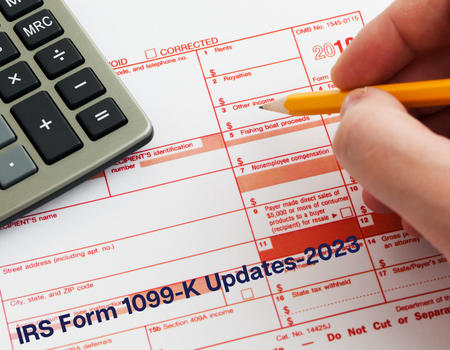Call us: +1-855-202-3299
Email: [email protected]
IRS Form 1099-K Update: 2022 Compliance and Changes for 2023
Speaker: Patrick Haggerty
Speaker Designation: Owner, Tax and Consulting Services

Call us: +1-855-202-3299
Email: [email protected]
Speaker: Patrick Haggerty
Speaker Designation: Owner, Tax and Consulting Services

Form 1099-K is used to report certain payment transactions including payments by payment cards (credit, debit, or stored value cards) and payments in settlement of third-party network transactions or through third party settlement organizations. Such organizations, for example, include PayPal, Uber, Venmo, E-Bay, and Air B & B.
According to the IRS, Form 1099-K reports the gross amount of all reportable transactions processed by a reporting entity, such as a payment card processor or third-party network. However, some third parties may also report non-reportable transactions, such as splitting the check for a non-business meal in a restaurant.
This webinar will cover the latest updates for Form 1099-K including the change in the reporting threshold scheduled to begin for 2023 Forms filed in 2024. It will discuss issuers, recipients, reportable transactions, and provide examples of how amounts should be reconciled and reported on recipient income tax returns.
The threshold for reporting transactions reportable on Form 1099-K to payees is scheduled to be reduced for third party settlement organizations from $20,000 and 200 transactions to $600 dollars. Many small businesses and non-business selling goods and services will be receiving these forms in 2024 that have not received them in prior years.
In nearly all cases, gross amounts reported on Form 1099-K will not represent actual taxable income for the recipient. It is important for recipients and their tax professionals know how to reconcile and report amounts included on 1099-K to achieve a compliant tax return, avoid paying tax on nontaxable items and avoid unnecessary correspondence from the IRS.
After this webinar you will:

Pat Haggerty is a tax practitioner, author, and educator. His work experience includes non-profit organization management, banking, manufacturing accounting, and tax practice. He began teaching accounting at the college level in 1988. He is licensed as an Enrolled Agent by the U. S. Treasury to represent taxpayers at all administrative levels of the IRS and is a Certified Management Accountant. He has written numerous articles and a monthly question and answer column for payroll publications. In addition, he regularly develops and presents webinars and presentations on a variety of topics including Payroll tax issues, FLSA compliance, information returns, and accounting.